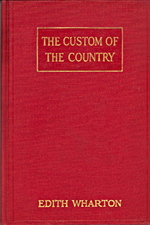1913: Wharton - The Custom of the Country
DiscussieLiterary Centennials
Sluit je aan bij LibraryThing om te posten.
Dit onderwerp is gemarkeerd als "slapend"—het laatste bericht is van meer dan 90 dagen geleden. Je kan het activeren door een een bericht toe te voegen.
1edwinbcn

The Custom of the Country by Edith Wharton was published in 1913.
It is a novel centred around a main character who can be best described as an anti-hero, and unscrupulous and spoilt young woman, driven by selfish ambition and greed.
2timjones
I posted a review of The Custom of the Country over in my "Club Read 2013" topic, and edwinbcn asked me to repost it here as a possible discussion starter - so here we go:
The Custom of the Country review
I like Edith Wharton's writing very much, and this novel has many of her strengths, but I struggled with it because of Edith Wharton's relentless snobbery towards her main character, Undine Spragg, a loathsome and predatory specimen of the "nouveau riche" who preys on and ingratiates herself into classy but faded old-money New York society.
Edith Wharton directs (or at least strongly nudges) the reader to hate Unidine and take the side of her victims, but the old rich of New York are no better than the nouveau riche in my view: their old money ultimately derives from expropriating Native American land, so why should I sympathise with them?
Thus, although Undine is most certainly far from likable, I found myself with a sneaking admiration for her, and felt that, portrayed by another author with a broader range of human sympathies, she could have emerged as a heroic, or at least anti-heroic, character. I'll fight you for her, Edith!
The Custom of the Country review
I like Edith Wharton's writing very much, and this novel has many of her strengths, but I struggled with it because of Edith Wharton's relentless snobbery towards her main character, Undine Spragg, a loathsome and predatory specimen of the "nouveau riche" who preys on and ingratiates herself into classy but faded old-money New York society.
Edith Wharton directs (or at least strongly nudges) the reader to hate Unidine and take the side of her victims, but the old rich of New York are no better than the nouveau riche in my view: their old money ultimately derives from expropriating Native American land, so why should I sympathise with them?
Thus, although Undine is most certainly far from likable, I found myself with a sneaking admiration for her, and felt that, portrayed by another author with a broader range of human sympathies, she could have emerged as a heroic, or at least anti-heroic, character. I'll fight you for her, Edith!
3Diane-bpcb
But I think that Edith Wharton delightfully satirized virtually every group she saw at different times in her writing life--old money (her own beginnings which she fought to escape), new money, individuals moving between those groups in either direction, the takers of newly fashionable drugs (in the early 20th c. Twilight Sleep), etc.
And, I think that Wharton's literary skills came out of her lifelong struggle with ultimately mixed feelings about her youth in that old moneyed society.
And, timjones, you even say that you had mixed feelings about Undine Spragg--I think we are all supposed to see both sides.
And, I think that Wharton's literary skills came out of her lifelong struggle with ultimately mixed feelings about her youth in that old moneyed society.
And, timjones, you even say that you had mixed feelings about Undine Spragg--I think we are all supposed to see both sides.
4Diane-bpcb
Sorry if I stopped the conversation with my previous post, or misunderstanding of it, but here's something interesting:
The Wall Street Journal published an article in December on The Custom of the Country: http://online.wsj.com/news/articles/SB10001424052702304096104579240523900725300 in its "Masterpiece" series.
The essay mentions, near the end, that twelve years after "Custom" was published, the Undine Spragg character "received a jazz-age makeover" in Anita Loos 's Gentlemen Prefer Blondes, which "sold wildly. It was a novel that Ms. Wharton loved so well that--perhaps seeing Undine's Spragg's reflection in it--she called it "the Great American Novel."
And, in fact, it wasn't just "perhaps seeing Undine Spragg." Edith Wharton's most recent biographer, Hermione Lee, mentions EW's enthusiasm about Gentlemen Prefer Blondes. EW wrote "Undine is at last vindicated!" about the book's success (following the disappointing sales of "Custom") and also of her having "passed the book around" to friends and her having it read aloud on a Mediterranean cruise she organized.
The Wall Street Journal published an article in December on The Custom of the Country: http://online.wsj.com/news/articles/SB10001424052702304096104579240523900725300 in its "Masterpiece" series.
The essay mentions, near the end, that twelve years after "Custom" was published, the Undine Spragg character "received a jazz-age makeover" in Anita Loos 's Gentlemen Prefer Blondes, which "sold wildly. It was a novel that Ms. Wharton loved so well that--perhaps seeing Undine's Spragg's reflection in it--she called it "the Great American Novel."
And, in fact, it wasn't just "perhaps seeing Undine Spragg." Edith Wharton's most recent biographer, Hermione Lee, mentions EW's enthusiasm about Gentlemen Prefer Blondes. EW wrote "Undine is at last vindicated!" about the book's success (following the disappointing sales of "Custom") and also of her having "passed the book around" to friends and her having it read aloud on a Mediterranean cruise she organized.
Aansluiten om berichten te kunnen plaatsen

